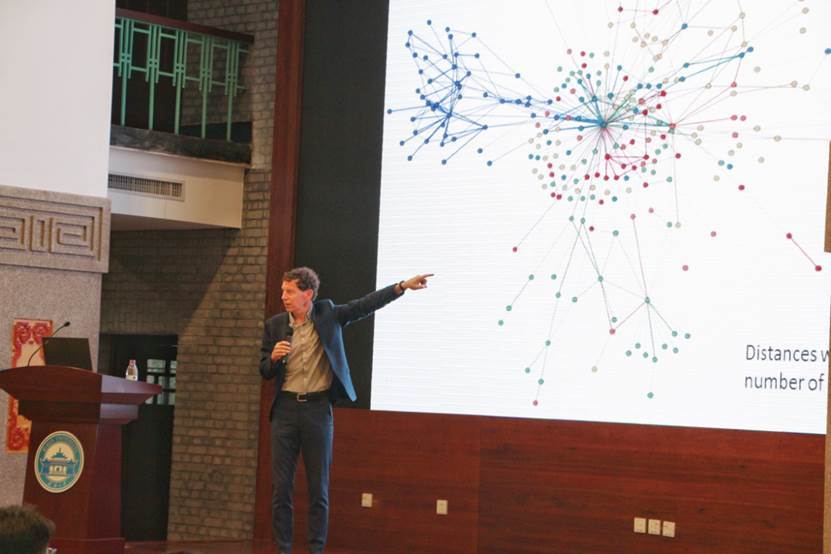Professor Frank of the European Academy of Sciences was invited to the 144th Luojia Forum
October 13, 2016 afternoon, Professor Frank van Harmelen , from the European Academy of Sciences, was invited to Wuhan University for 144th Luojia Forum.
Professor Frank gave a lecture entitled "From a Web of Information to a Web of Knowledge", which attracted more than 300 people from all over the world to participate in the Luojia Forum. Current status of the Internet were explained, Prof. Frank pointed out that the current characteristics of information and data for fast growth, complex and diverse, varied data sources, semantic information are more ambiguous. For such a complex information network, to build a higher level of knowledge network, Professor Frank proposed the need to develop a standard expression, a unified expression model and the description of the corresponding resource information. Professor Frank also listed examples of the use of semantic networks in government agencies and proposed new challenges such as knowledge clustering and semantic context analysis. Finally, Prof. Frank put forward the expectation of the participants to work together to build a future knowledge network.
Through the seminar, people has a new understanding of the international research on semantic network and knowledge network. In the free exchange section, Professor Frank also communicated on the organization of uncertain knowledge and in-depth learning for semantic analysis.
The Luojia forum, made that we understand and learn the latest international research trends, academic exchanges have played a positive impact.

Frank van Harmelen (1960) is a professor in Knowledge Representation & Reasoning in the Computer Science department (Faculty of Science) at the Vrije Universiteit Amsterdam. After studying mathematics and computer science in Amsterdam, he moved to the Department of AI in Edinburgh, where he was awarded a PhD in 1989 for his research on meta-level reasoning. While in Edinburgh, he co-developed a logic-based toolkit for expert systems, and worked with Prof. Alan Bundy on proof planning for inductive theorem proving. After his PhD research, he moved back to Amsterdam where he worked from 1990 to 1995 in the SWI Department under Prof. Wielinga, on the use of reflection in expert systems, and on the formal underpinnings of the CommonKADS methodology for Knowledge-Based Systems. In 1995 he joined the AI research group at the Vrije Universiteit Amsterdam, where he now leads the Knowledge Representation and Reasoning Group.
Since 2000, he has played a leading role in the development of the Semantic Web, which aims to make data on the web semantically interpretable by machines through formal representations. He was co-PI on the first European Semantic Web project (OnToKnowledge, 1999), which laid the foundations for the Web Ontology Language OWL. OWL has become a worldwide standard, it is in wide commercial use, and has become the basis for an entire research community. He co-authored the Semantic Web Primer, the first academic textbook of the field and now in its third edition, which is in worldwide use (translations in 5 languages, 10.000 copies sold of the English edition alone). He was one of the architects of Sesame, an RDF storage and retrieval engine, which is in wide academic and industrial use with over 200,000 downloads. This work received the 10-year impact award at the 11th International Semantic Web Conference in 2012, which is the most prestigous award in the field.
In recent years, he pioneered the development of large scale reasoning engines. He was scientific director of the 10m euro EU-funded Large Knowledge Collider, a platform for distributed computation over semantic graphs with billions of edges. The prize-winning work with his student Jacopo Urbani has improved the state of the art by two orders of magnitude.
He is scientific director of The Network Institute. In this interdisciplinary research institute some 150 researchers from the Faculties of Social Science, Humanities and Computer Science collaborate on research topics in computational Social Science and e-Humanities.
He is a fellow of the European AI Society ECCAI (membership limited to 3% of all European AI researchers), in 2014, he was admitted as member of the Academia Europaea (limited to the top 5% of researchers in each field), and in 2015 he was admitted as Member of the Royal Netherlands Society of Sciences and Humanities (450 members across all sciences). He is a guest professor at the University of Science and Technology in Wuhan, China.





 WeChat official account
WeChat official account